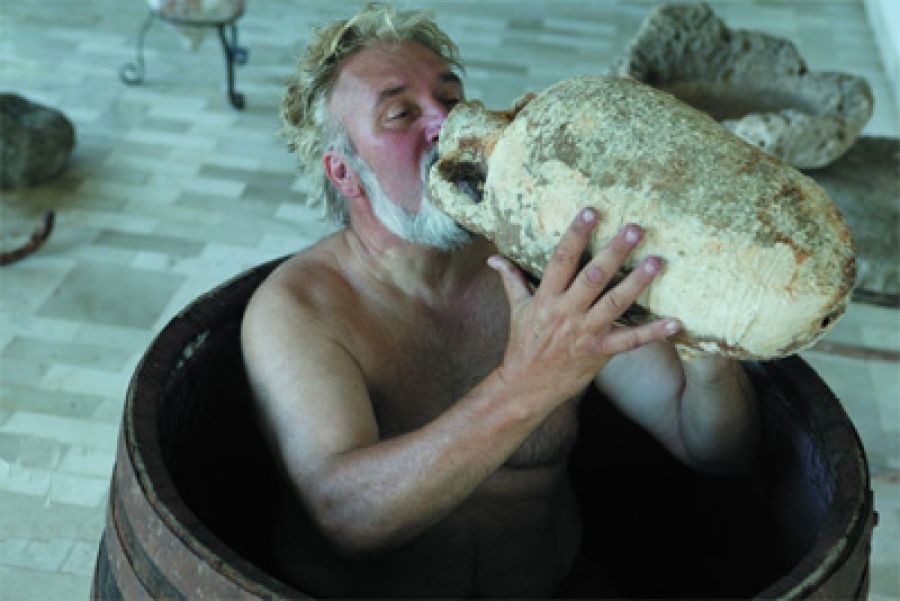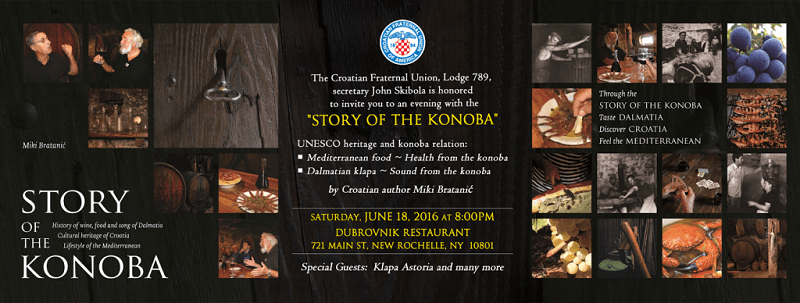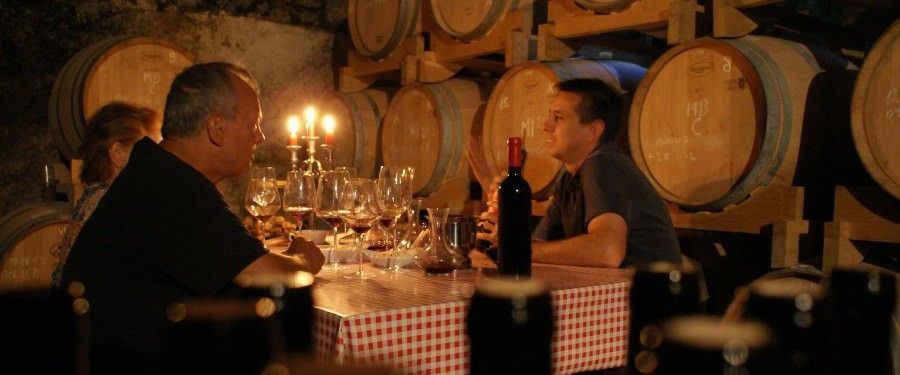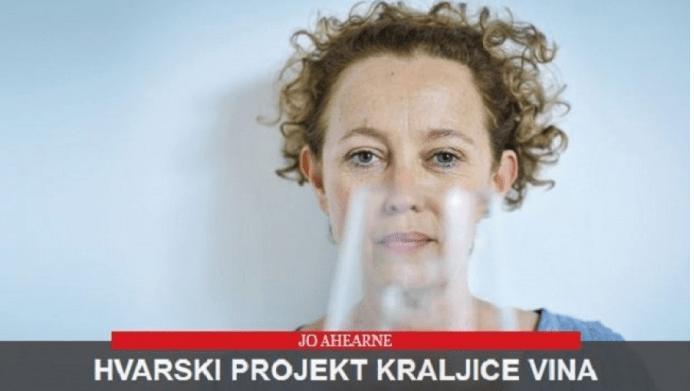Despite its fascinating wine story with some 130 indigenous grape varieties and a rich, healthy and diverse regional cuisine which consistently impresses tourists, Croatia lags far behind France, Italy, Spain and Germany in gourmet tourism. It shouldn't.
I have a friend in Dalmatia who has worked in tourism for at least ten years. He started out as a regular agency, offering the standard tours and made a decent living. These days, he does a lot more specialised tours for the luxury traveller, creating incredible experiences for wealthy tourists, who cannot get enough of the authentic Dalmatia he shows them. One of the keys to his success is understanding what many tour operators here do not - simple is beautiful.
"My eyes were opened by a rich tourist from New York. We had had an incredible tour on Hvar - speedboat trip to Zlatan Otok for wine tasting, sailing around the Pakleni islands, a Jeep safari all over the island, lots of great things. And at the end, this New Yorker came over to tip me (and he tipped well) and told me his most memorable experience on the entire trip. 'I just cannot tell you how incredible it was to pick that lemon from the tree. A fresh lemon, picked straight from the tree. No chance of having that experience in the store back home.' "
My friend learned from that experience and started moving away from the standard tours and looking for the outstanding and unique experiences that Dalmatia had to offer. And they were plentiful. And simple. With several exclusive tours and working with the best local chefs and winemakers in the most authentic of surroundings, the food and wine section of his business is growing quicker than any other. And it is very lucrative. I know a handful of agencies who are doing similar things, and they are all doing well, but they are just a handful.
It is five years since Anthony Bourdain's infamous 'No Reservations: Croatia' show which was arguably one of the finest global promotions ever. The show, on the Travel Channel, was seen by millions (short trailer above) and many marvelled at the astonishing food and wine experiences Bourdain uncovered. This is what he had to say:
"What's going on here? I didn't have any idea what Croatian cuisine was. Zero. I had no picture in my mind. This is world class food, this is world class wine, this is world class cheese. The next big thing is Croatia. If you haven't been here, you are a ******* idiot. I'm an idiot."
And yet, some five years later, despite major initiatives to extend the season, such as Croatia365, Croatia's huge gourmet tourism potential remains largely untapped. Meanwhile, France, Spain, Italy and even Germany are established gourmet tourism destinations, bringing in millions of euro into the national economy, while Croatia gets gourmet crumbs by comparison.
Why?
Just a quick look at the diverse regional offer will show the potential. Croatia's Tuscany and the gourmet heart of the country, Istria, with its truffles, world-class olive oil and malvasia wines; Dalmatia with its rich seafood offer, original Zinfandel, and a Mediterranean diet which is part of intangible UNESCO heritage on Hvar and Brac; and the hearty meat and river fish offerings of Slavonia and Baranja, washed down with local wines which graced the coronation of Queen Elizabeth II. Unique dishes - soparnik, vitalac, dormouse stew - simple dishes which ooze authenticity and originality, washed down with the finest wines from local grape varieties wine lovers are fascinated to discover.
A few years ago, I helped promote a wine tasting of Croatian (mostly Hvar) wines in an exclusive restaurant in Oslo. Some of Norway's leading wine critics and sommeliers were at the tasting of 48 Croatian wines. The evening was a success, and the wines were well received, but the ones that stood out were not the polished wines of Krauthaker and Bibich, but the authentic and rustic indigenous grape varieties from Hvar.
Simple, authentic experiences, which Croatia has in abundance.
So how to develop this gourmet tourism? Part of the problem, at least in my opinion, is that local people do not understand the value of what they have, from a tourist point of view. It would never occur to the majority that picking a lemon from a tree might be a special experience for an urban city dweller, or that people might want to know about an olive tree on Hvar which is 2,500 years old near Zastrazisce. A good example of how Croatia is not capitalising on its gourmet potential can be illustrated with the wines of Hvar.
Moving on from the fact that Dalmatia, despite being the home of the original Zinfandel and one of Croatia's most important wine regions, still does not have a wine road, nowhere is the potential and the reality of Croatia's gourmet tourism better explained.
The majority of tourists coming to Hvar leave without realising it is a wine island. You can't blame them. Unlike Istria, whose restaurateurs are fiercely patriotic and aggressively promote the local Istrian winemakers, many of the restaurants on Hvar choose not to promote local wine on their lists, but opt instead for wines from Istria, the rest of continental Croatia and international labels. This is not due to the poor quality of Hvar wines - they are exported as far away as California and China, regularly win organic gold in Germany, and one wine from Caric even has a special menu devised for it in a 3-star Michelin restaurant in Holland. The island has several micro-climates and differing terroirs, as well as several indigenous grape varieties, which only grow on Hvar.
A wine enthusiast's dream. And yet...
Add to the fact that Hvar's olive oils are internationally recognised - gold medals in New York and (love this one), the most expensive olive oil in the world, which sold for £3,750 a litre - and the beauty and heritage of the island, and all the ingredients are there for an exceptional and unique gourmet experience. And there are even plenty of lemons to pick from the trees. Almost five years ago, the President of the Hvar Wine Association came up with a great idea called Hvar Wine Time Traveller, a concept to tell the story of the wines of Hvar through its incredible history and heritage - a wine story which began 2,400 years ago with the arrival of the Ancient Greeks. The olive trees and vines they planted 400 years before Christ are now the site of one of Croatia's eleven UNESCO World Heritage Sites, the Stari Grad Plain.
Taking the idea of Hvar Wine Time Traveller a little further, here is an example of what can be experienced, not including Hvar's fabulous food offering.
384 BC - Visiting the UNESCO World Heritage Site of the Stari Grad Plain, where cultivation of olives and grapes has continued uninterrupted for some 2,400 years. Wine tasting of those wines on site from a local producer.
The Roman era - Hvar has a rich Roman heritage, with influences in the Stari Grad Plain and elsewhere, including the tiny settlement of Vlaka on the Pakleni Islands, which is home to a Roman mud bath and remains of a villa rustica, as well as the lowest vineyard on the Adriatic, just one metre above sea level. The Roman theme continues with wine tasting and (optional) togas in the Romanesque cellars of Andro Tomic in Jelsa.

Matej Ivanic and the Great Rebellion - An important time in Hvar's history, the Great Rebellion with local hero Matej Ivanic ended in 1514. Ivanic was born in Vrbanj and lived in Vrboska, two interesting locations for wine tasting. Vrbanj is home to Miki Bratanic's famous Konoba, now a cultural monument, and his wine labels bear the name of the 16th century here, and Antun Plancic is recognised as the first successful private winemaker in former Yugoslavia. The short trip to Vrboska includes the authentic konoba experience offered by Pinjata, as well as the canal-side wines of Caric, including that 3-star Michelin superstar.

Phylloxera in the 19th Century. Hvar used to have 5700 hectares of wines under cultivation, today it has just 280. Phylloxera and new tax laws from the Austro-Hungarian Empire combined to decimate the Hvar wine industry and led to emigration. Ivan Dolac on the south side houses a church built in the hope that the phylloxera would stop. While there, an excellent time to visit Zlatan Otok and his underwater winery. And this period of Hvar's wine history would not be complete without a visit to the oldest Plavac Mali vineyard in the world.
Socialism dominated the 20th century on Hvar, and cooperatives were the order of the day in former Yugoslavia. While socialist cooperatives do not have much of a reputation for quality in general, there are exceptions, and PZ Svirce was the first winery in Croatia with a certified organic Plavac Mali, and its organic range regularly win international organic golds, especially its flagship product, Ivan Dolac Barrique. A tour of the winery is a great insight into the working of cooperatives in this recent era.

Independence brought a new breed of winemaker - the age of the small private entrepreneur. Andro Tomic, Ivo Dubokovic, Antun Plancic, Teo Huljic, Tonci Marijan, Ivo Caric, Vjekoslav Vujnovic, the vast majority of whom are working with the local grapes of Hvar. In addition to more generic sorts, such as Plavac Mali and Posip, here one finds unique experiences from the grapes of Bogdanusa, Darnekusa, Prc, Kuc and Mekuja.

We are up to the present day, but the Hvar wine story keeps evolving. In 2014, the first Master of Wine ever to make wine in Croatia started producing wines from Hvar's grapes. Jo Ahearne MW's arrival was one more addition to the incredible wine story, and her range of four Hvar wines have been met with critical acclaim. She is an accomplished speaker and offers a fantastic tasting experience, a superb closing chapter in the Hvar Wine Time Traveller experience.
There, briefly, is the potential. Add to that the beauty of the island, its fabulous food based on the UNESCO Mediterranean diet, and all its attractions and endless sun, and one has a true gourmet paradise. 12 months a year with the proper organisation.
And then we have the reality. Most tourists leave without knowing Hvar they were staying on a wine island.
It really shouldn't be that way, especially in a country which lives from tourism.
For Hvar, read almost anywhere in Croatia for its gourmet tourism story. So many unique and simple experiences which are not properly presented, so many opportunities missed.
Things are changing, albeit slowly. One of the most exciting initiatives I have seen in Croatian tourism in recent years took place last month in Dalmatia. SplitB2B, an attempt to promote special interest tourism in Croatia, had its first conference focusing on food and wine tourism. 18 agencies from 11 countries were hand-picked for the conference, the key criteria being that they worked in European countries in food and wine tourism, but had no previous connection to the Croatia market. The first three days included three trips around Dalmatia to seduce them, followed by B2B workshops with 35 local destination management agencies. There were no lemons to pick, but plenty of olives, and all international participants marvelled at the olive picking experience, all the more so when the day on Brac ended at the olive museum in Skrip, where everyone was presented with a small bottle of oil from their labour earlier in the day. Read more about SplitB2B here.
Simple, authentic experiences.
SplitB2B was a huge success, and a direction that Croatia needs to head to take advantage of one of the richest segments of its tourism potential. The season is getting longer, hotels and restaurants are open longer, flights are more and more accessible. It is time for Croatia to wake up to the possibility.
The time is now.
I spoke to Jurica Glavina, President of the Destination Management Companies Association, and an organiser of SplitB2B, about the conference and developing gourmet tourism:
"The aim of the conference and business workshop was presenting Croatia and Dalmatia as a “Food & Wine” tourism destination to foreign tourist agencies and tour operators, raising their interest in our product and, at the same time, enable them to have business meetings with Croatian destination management companies as their potential future partners. This way we got a complete product that will result in new revenue from tourism, arrivals and overnight stays of guests with a higher purchasing power (mostly in pre- and post-season) because, up to that moment, none of the selected and invited “hosted buyers” had included Croatia in their offer.
"Talking to conference participants, particularly to those who came from abroad, we received another confirmation of what we already know – that Croatia has all the means necessary to become a gourmet tourism star on the global tourist market. Even though the steps forward that Croatia as a destination has made in the past few years when it comes to infrastructure, product, personnel, and marketing have been small, they certainly suggest that this is the right way to go. Progress can be seen in understanding the importance of this market niche on all levels of the private and, more importantly, public sector. Although there are several possible concepts for this product, I believe that the right one is the one in which we offer ourselves, our way of life and original and indigenous products to our guests. If we add our cultural and historical heritage to this, as well as professionalism and expert personnel, we get a premium product – a recipe for success."
When was the last time you picked a lemon from a tree?



